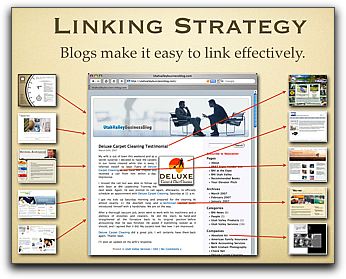 One of the reasons we call the world-wide-web a 'network' is because there are relationships between sites and pages that make navigation easy, informative, and even fun. Those relationships are made obvious via hyperlinks. Hyperlinks are, of course, those clickable links that take us to a new page.
One of the reasons we call the world-wide-web a 'network' is because there are relationships between sites and pages that make navigation easy, informative, and even fun. Those relationships are made obvious via hyperlinks. Hyperlinks are, of course, those clickable links that take us to a new page.
We have come to rely on links to get us from point 'A' to point 'B' in a relational context, and to provide a sum of information greater than the single page we are visiting. This concept is important in search engine marketing...
Search engines deliver a product to their customers, and that product is a list of search results based on keyword input. If you type into a search engine the words 'tooth whitening', you would expect to receive a list of web sites that are relevant to 'tooth whitening'. Search engine companies know that you will be frustrated with their results if the list does not satisfy at least three basic requirements:
- Relevant: The resulting sites listed have to be relevant to your keyword search request; in this case 'tooth whitening';
- Current: The resulting sites listed need to present information that is current and not outdated;
- Informative: The resulting sites listed need to be informative.
Search engine companies work very hard to satisfy these requirements. It is a hard thing to do, and it is difficult to perfect. For this reason there are a few clear leaders in the search engine market, and they are pouring millions into measuring these factors accurately so they can continue providing a good 'product'.
One important factor in demonstrating relevance, currency, and informativeness is linking.
There are two types of linking strategies you should employ, each of which is important and should not be considered without the other. One is 'incoming' links, and the other is 'outgoing' links.
We have all heard that incoming links are important, and they are. Search engines are interested in the number of other sites that are linking to yours. This helps establish a certain degree of popularity and relevance. The thinking goes that if your site is linked to from many other sites, then your site must me important to the sites within your category.
Search engines are wary of incoming link strategies because there are so many ways to 'cheat'. For instance, some marketers have essentially carpet-bombed the internet with links to their own site. There are tools and services that make this easy, but there is a risk: carpet-bombing your URL all over the web means that you will be receiving links from sites that are not relevant, and therefore dilute your site's relevance factor.
To explain: Imagine your site about 'tooth whitening' receives links from sites that specialize in 'saddles', 'hunting', and 'political commentary'. Search engines will measure these factors and may determine that your site is not relevant to any of these items, including 'tooth whitening'. Your site appears to be the equivalent of a 'dictionary' to the search engines, with no clear or specific subject (at least based on the links).
Your best rule of thumb with incoming links is to cultivate links from relevant sites, and to reject links from sites that are too disparate. Links from social bookmarking sites are the exception, and simply indicate popularity without focus on relevance.
The second linking strategy you need to consider is 'outbound' linking. Perhaps even more important that inbound linking, outbound linking considers the links you have created on your site, and to which sites they point to.
There has been general reluctance on the part of our clientele for linking to other sites based on a desire to contain visitors to their own site. This is an important consideration and there are, of course, appropriate and innapropriate times and places to place outbound links. For bloggers, who's primary product is 'information', outbound links are critical.
When a search engine measures your site for relevance, currency, and informativeness, they look at the sites to which you are linking for a 'second opinion' of who you are and what you have to say.
Most importantly, outbound links tell the search engines that your visitors will be introduced to additional relevant content that is beyond your site. Think about it: when a search engine delivers their 'product', they want to present sites that are relevant, current, and informative. How better to add value to this objective than to include additional destinations in your presentation?
Put a different way: Search engines would rather deliver a relevant starting point in a search result than a 'dead end'. Is your site a 'dead end', with no exits to relevant pages? Or are you a 'great place to get started' with lots of relevant places to go?
Which site would you rather get in a search result? ...See what I mean?
Bottom line: Cultivate lots of links from relevant external sites, and don't be afraid to create links within your content that reveal relevant, interesting places to go. You will literally help others while you help yourself. It's a network, after all.
Tip: Make sure your links open the destination page in a new window or tab so your visitors don't loose you.



